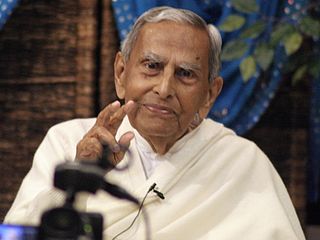A Quote by Dalai Lama
Since we desire the true happiness that is brought about by a calm mind, and such peace of mind arises only from having a compassionate attitude, we need to make a concerted effort to develop compassion.
Related Quotes
When we speak of a calm state of mind or peace of mind, we shouldn't confuse that with an insensitive state of apathy. Having a calm or peaceful state of mind doesn't mean being spaced out or completely empty. Peace of mind or a calm state of mind is rooted in affection and compassion and is sensitive and responsive to others.
Happiness, true happiness, is an inner quality. It is a state of mind. If your mind is at peace, you are happy. If your mind is at peace, but you have nothing else, you can be happy. If you have everything the world can give - pleasure, possessions, power - but lack peace of mind, you can never be happy.
An affectionate disposition not only makes the mind more peaceful
and calm, but it affects our body in a positive way too. On the
other hand, hatred, jealousy and fear upset our peace of mind, make
us agitated and affect our body adversely. Even our body needs peace
of mind and is not suited to agitation. This shows that an
appreciation for peace of mind is in our blood.
In the beginner's mind there is no thought, "I have attained something." All self-centered thoughts limit our vast mind. When we have no thought of achievement, no thought of self, we are true beginners. Then we can really learn something. The beginner's mind is the mind of compassion. When our mind is compassionate, it is boundless. Dogen-zenji, the founder of our school, always emphasized how important it is to resume our boundless original mind. Then we are always true to ourselves, in sympathy with all beings, and can actually practice.
It is a basic human need that everyone wants to
live a happy life. For this, one has to experience
real happiness. The so-called happiness that one
experiences by having money, power, and
indulging in sensual pleasures is not real
happiness. It is very fragile, unstable and fleeting.
For real happiness, for lasting stable happiness,
one has to make a journey deep within oneself and
get rid of all the unhappiness stored in the deeper
levels of the mind. As long as there is misery at
the depth of the mind all attempts to feel happy
at the surface level of the mind prove futile.
I believe that a life of integrity I the most fundamental source of personal worth. I do not agree with the popular success literature that says that self-esteem is primarily a matter of mind set, of attitude-that you can psych yourself into peace of mind. Peace of mind comes when your life is in harmony with true principles and values and in no other way.
The art of loving creates the unity which has unlimited spiritual strength, and that is the greatest need in the world today, and each and every one of us can make such a difference if we become humble, if we develop a service attitude rather than an exploitative attitude, if we develop the broad mind to see the oneness and to learn to love all living beings.
The compassion we feel normally is biased and mixed with attachment. Genuine compassion flows towards all living beings, particularly your enemies. If I try to develop compassion towards my enemy, it may not benefit him directly, he may not even be aware of it. But it will immediately benefit me by calming my mind. On the other hand, if I dwell on how awful everything is, I immediately lose my peace of mind.





































